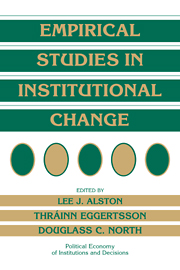Book contents
- Frontmatter
- Contents
- List of contributors
- Series editors' preface
- Acknowledgments
- Introduction
- A note on the economics of institutions
- Empirical work in institutional economics: an overview
- 1 Toward an understanding of property rights
- Economic variables and the development of the law: the case of western mineral rights
- 2 Impediments to institutional change in the former Soviet system
- Why economic reforms fail in the Soviet system: a property rights–based approach
- 3 Transaction costs and economic development
- Public institutions and private transactions: a comparative analysis of the legal and regulatory environment for business transactions in Brazil and Chile
- 4 The evolution of modern institutions of growth
- Constitutions and commitment: the evolution of institutions governing public choice in seventeenth-century England
- 5 Regulation in a dynamic setting
- The political economy of controls: American sugar
- 6 Price controls, property rights, and institutional change
- Roofs or stars: the stated intents and actual effects of a rents ordinance
- 7 Regulating natural resources: the evolution of perverse property rights
- Legally induced technical regress in the Washington salmon fishery
- 8 The politics of institutional change in a representative democracy
- A political theory of the origin of property rights: airport slots
- 9 The economics and politics of institutional change
- Paternalism in agricultural labor contracts in the U.S. South: implications for the growth of the welfare state
- Epilogue: economic performance through time
- Author index
- Subject index
- POLITICAL ECONOMY OF INSTITUTIONS AND DECISIONS
Legally induced technical regress in the Washington salmon fishery
Published online by Cambridge University Press: 05 June 2012
- Frontmatter
- Contents
- List of contributors
- Series editors' preface
- Acknowledgments
- Introduction
- A note on the economics of institutions
- Empirical work in institutional economics: an overview
- 1 Toward an understanding of property rights
- Economic variables and the development of the law: the case of western mineral rights
- 2 Impediments to institutional change in the former Soviet system
- Why economic reforms fail in the Soviet system: a property rights–based approach
- 3 Transaction costs and economic development
- Public institutions and private transactions: a comparative analysis of the legal and regulatory environment for business transactions in Brazil and Chile
- 4 The evolution of modern institutions of growth
- Constitutions and commitment: the evolution of institutions governing public choice in seventeenth-century England
- 5 Regulation in a dynamic setting
- The political economy of controls: American sugar
- 6 Price controls, property rights, and institutional change
- Roofs or stars: the stated intents and actual effects of a rents ordinance
- 7 Regulating natural resources: the evolution of perverse property rights
- Legally induced technical regress in the Washington salmon fishery
- 8 The politics of institutional change in a representative democracy
- A political theory of the origin of property rights: airport slots
- 9 The economics and politics of institutional change
- Paternalism in agricultural labor contracts in the U.S. South: implications for the growth of the welfare state
- Epilogue: economic performance through time
- Author index
- Subject index
- POLITICAL ECONOMY OF INSTITUTIONS AND DECISIONS
Summary
The history of the Washington salmon fishery is a legal and economic horror story. When the whites first encountered the flourishing aboriginal fishery, they failed to recognize the virtues of its technical and, in a certain sense, legal organization. Determined to transform into private wealth an immensely valuable natural resource, they rushed to appropriate the salmon fishery and threatened its survival. The state's voters, legislators, and appointed managers of the fishery, where the salmon ostensibly “belonged” to all the citizens of Washington collectively, would not permit outright destruction of the resource. But their response to the threat of overfishing was neither to limit entry into the fishery nor to create and enforce a private property right in it, something the Indians had approximated before the advent of the whites. Rather, the state's solution was to limit the harvest by penalizing or prohibiting the more productive harvesting techniques. In the Washington fishery today fewer than 10,000 commercial fishermen, aided by many millions of dollars' worth of fishing gear, harvest about 6 million salmon annually. Before World War I a similar number of men, working with much less than the modern amount of capital, normally harvested three to four times more salmon each year. Thus, commercial fishing productivity is now only a small fraction of what it was 70 years ago. This technical regress did not have to happen; in no sense was it inexorable.
- Type
- Chapter
- Information
- Empirical Studies in Institutional Change , pp. 247 - 279Publisher: Cambridge University PressPrint publication year: 1996
- 15
- Cited by



